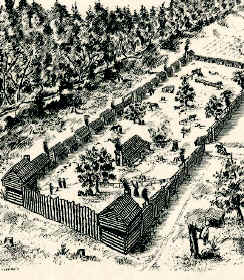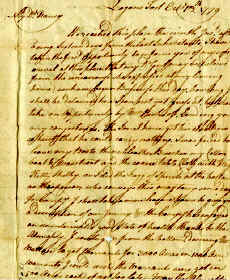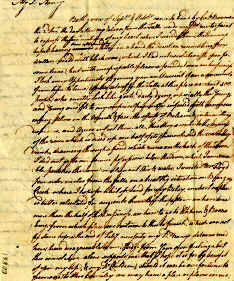Colonel William Fleming in Frontier Kentucky
By Jacob F. Lee
Special Collections Assistant
About |
In early 2006, The Filson received a package from a donor who
had inherited family papers collected by his mother. He was not
sure how interesting the material would be, but he realized that it
was important to preserve the collection. He informed us that the
material was probably of little significance, mostly family letters and
genealogy. As always, we were happy to look at the collection. As
we examined the collection, we realized that the material contained
a wealth of information for researchers interested in Kentucky and
Virginia in the 18th century. The bulk of the Fleming-Edmonds
Family Papers is the correspondence of Col. William Fleming, a
Virginia soldier, doctor and legislator. His papers included letters
from his parents in Dumfries, Scotland, letters that Fleming wrote
to his wife while traveling in Virginia and Kentucky, and additional
material from his son, Leonard, who settled in Kentucky toward
the end of the century. These letters contain information about a
variety of aspects of life in colonial Virginia and Kentucky, and
particularly the quality of life in early Kentucky.
his mother. He was not
sure how interesting the material would be, but he realized that it
was important to preserve the collection. He informed us that the
material was probably of little significance, mostly family letters and
genealogy. As always, we were happy to look at the collection. As
we examined the collection, we realized that the material contained
a wealth of information for researchers interested in Kentucky and
Virginia in the 18th century. The bulk of the Fleming-Edmonds
Family Papers is the correspondence of Col. William Fleming, a
Virginia soldier, doctor and legislator. His papers included letters
from his parents in Dumfries, Scotland, letters that Fleming wrote
to his wife while traveling in Virginia and Kentucky, and additional
material from his son, Leonard, who settled in Kentucky toward
the end of the century. These letters contain information about a
variety of aspects of life in colonial Virginia and Kentucky, and
particularly the quality of life in early Kentucky.
Fleming was born in Scotland in 1729 and studied medicine at
the University of Edinburgh, before entering the British Navy. When
he  was discharged from the Navy in 1755, he immigrated to Virginia
and enlisted in George Washington’s Virginia Regiment. After
the end of the French and Indian War, he moved to Staunton, VA,
where he established a medical practice, before turning to farming
in Botetourt (now Montgomery) County. As the state representative
for Botetourt, Washington, Montgomery and Kentucky Counties,
Fleming took a strong interest in Virginia’s burgeoning western
settlements, particularly the issue of disputed land claims. In 1779,
Fleming traveled to Kentucky as part of a commission formed to
settle land titles. After returning from Kentucky later that year,
Fleming continued his public life. He went back to Kentucky several
more times and served as Virginia’s acting governor in June
1781 and as a member of the 1788 convention that ratified the
United States Constitution. He died in 1795.
was discharged from the Navy in 1755, he immigrated to Virginia
and enlisted in George Washington’s Virginia Regiment. After
the end of the French and Indian War, he moved to Staunton, VA,
where he established a medical practice, before turning to farming
in Botetourt (now Montgomery) County. As the state representative
for Botetourt, Washington, Montgomery and Kentucky Counties,
Fleming took a strong interest in Virginia’s burgeoning western
settlements, particularly the issue of disputed land claims. In 1779,
Fleming traveled to Kentucky as part of a commission formed to
settle land titles. After returning from Kentucky later that year,
Fleming continued his public life. He went back to Kentucky several
more times and served as Virginia’s acting governor in June
1781 and as a member of the 1788 convention that ratified the
United States Constitution. He died in 1795.
Fleming’s letters from his 1779 journey to Kentucky are among most interesting items in the collection. While they often deal with the land disputes he had gone to resolve, they also offer a stark depiction of life in pioneer Kentucky. The bleakest description of the pioneer experience comes in a letter Fleming wrote to his wife in early December. Writing from Harrodsburg, Fleming described a trip to the Falls of the Ohio, where there were “about 500 people who mostly look like g’osts, daily dying.” In the 19th century, Louisville, a breeding ground for disease, earned the nickname “the Graveyard of the West,” and Fleming’s letters show that early settlers were also plagued by unhealthy conditions. Describing illnesses thought to be the result of contaminated water from ponds that sat behind the town, Fleming wrote, “the affects of Bilious & intermitting disorders and Agues infest them all.” In addition to the physical ailments the pioneers suffered, they also experienced a lack of provisions. Fleming’s party encountered the Nicholas Welch family who had endured particularly bad luck, and when Fleming found them, they were “lodged in a hollow tree.”
Even in areas where health issues were less of a concern, pioneer
life was still difficult and dangerous. In the letter where he describes
the illnesses afflicting settlers at the Falls of Ohio, he states that there
is “a healthy situation” five or six miles up Beargrass Creek, yet the settlers were not safe from all the perils of frontier life. The dangers
farther away from the Falls came from Indians, who raided into the
area until the early-1790s. Fleming wrote to his wife that “a family
from Carolina perished on the road to this country,” but, he continued,
“a few scalps & prisoners taken by the Enimy [is] a thing scarce
noticed here.” Later letters to Fleming from relatives in Kentucky
also discuss the fear and reality of Indian attacks. In June 1789, Mary
Fleming wrote that Indians had killed a woman at the spring on her
farm on Beargrass Creek. Another man, she said, had been killed
two days before they arrived in Jefferson County. Fleming stated
that she had “suffered greatly with fear.” In a letter to his father,
Leonard Fleming reported that “the Indians is pecking all round the
settlements of Kentucky,” including those in Jefferson County. According
to Leonard, the settlers were on constant guard against attacks
from the Indians who had been in the area. He concluded, “I
think it is not safe to go to Beargrass.”
the letter where he describes
the illnesses afflicting settlers at the Falls of Ohio, he states that there
is “a healthy situation” five or six miles up Beargrass Creek, yet the settlers were not safe from all the perils of frontier life. The dangers
farther away from the Falls came from Indians, who raided into the
area until the early-1790s. Fleming wrote to his wife that “a family
from Carolina perished on the road to this country,” but, he continued,
“a few scalps & prisoners taken by the Enimy [is] a thing scarce
noticed here.” Later letters to Fleming from relatives in Kentucky
also discuss the fear and reality of Indian attacks. In June 1789, Mary
Fleming wrote that Indians had killed a woman at the spring on her
farm on Beargrass Creek. Another man, she said, had been killed
two days before they arrived in Jefferson County. Fleming stated
that she had “suffered greatly with fear.” In a letter to his father,
Leonard Fleming reported that “the Indians is pecking all round the
settlements of Kentucky,” including those in Jefferson County. According
to Leonard, the settlers were on constant guard against attacks
from the Indians who had been in the area. He concluded, “I
think it is not safe to go to Beargrass.”
The Fleming-Edmonds Family Papers is a valuable addition to The Filson’s Special Collections. In addition to describing his travels in Kentucky, Fleming’s correspondence also contains information about the Revolutionary War in Kentucky and Virginia, references to slavery in early Kentucky, and an account of the famous duel between Thomas S. Kennedy and William Gillespie. In addition to the correspondence of William Fleming, the collection also includes journals kept by William B. Fleming during vacations through Europe in the late-19th century and correspondence with Woodrow Wilson while Fleming worked in the State Department in the 1910s. The collection also contains photostats of letters from William McNeil Armstrong, discussing preparations for Commodore Matthew C. Perry’s 1852-1854 expedition to Japan. Because the donor had the foresight to realize that someone might find significance in his family papers and then made the effort to find a home for it, this collection will now be preserved for generations to come.
![]()
The Filson Historical Society
1310 South Third Street - Louisville, KY 40208
Phone: (502) 635-5083 Fax: (502) 635-5086
Hours
The Ferguson Mansion and Office
Monday - Friday: 9 am. - 5 pm.
Saturday and Sunday closed
Library
Monday - Friday: 9 am. - 5 pm.
Saturday: 9 am. - 12 noon
